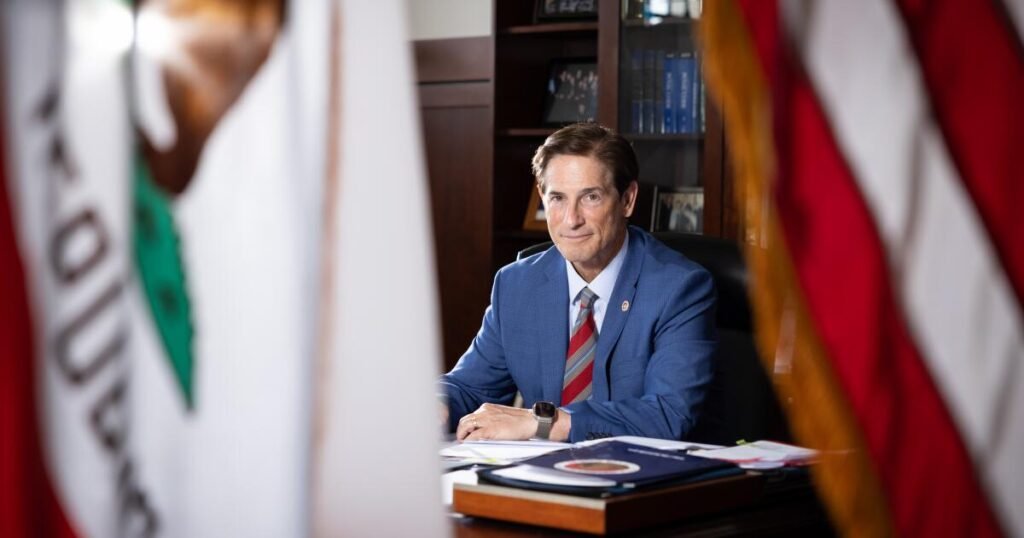Last month, President Trump sent the National Guard to Los Angeles County in response to protests against immigrant raids, asserting that lawlessness necessitated the deployment. Shortly after, LA County District Attorney Nathan Hochman appeared before the media to discuss charges against individuals accused of attacking police during those protests. While he refrained from mentioning Trump or the federal agents present, Hochman aimed to shift the narrative away from what he described as chaotic scenes from the White House.
He highlighted that the unrest was mostly confined to a small area of downtown and asserted his commitment to holding those accountable for legal violations, challenging the idea that Los Angeles was “under siege.” Reflecting on the situation in a recent interview with the Times, Hochman said he wished to clarify matters without fueling partisan disputes.
“What I see and hear feels like a political discourse I’m not keen to engage in,” he remarked. “It often misrepresents what’s really happening.” Initially a Republican, Hochman became an independent last year and stated his intention to move away from political affiliations in the DA’s office. He had previously supported Kamala Harris in the 2024 presidential election but preferred to maintain his “hard middle” approach rather than revert to practices criticized during his predecessor’s tenure.
About six months into his term, some law enforcement and prosecutors indicate that Hochman has brought a “return to normalcy” after the controversial policies of his progressive predecessor, George Gascon. By discarding many of Gascon’s sweeping changes, Hochman has allowed prosecutors to act based on their judgment, restoring a semblance of harmony within the office.
However, Trump’s strict immigration enforcement poses challenges to Hochman’s stance of neutrality. For example, when federal agents pursued and detained two women in an LA courthouse last month, the incident raised eyebrows among local legal advocates. “If county prosecutors don’t express their positions, it might silence community support,” remarked Ricardo Garcia, the LA County public defender.
Hochman insists that his office does not collaborate with federal immigration enforcement and hopes immigrants will first address issues at the state level. “I focus on public safety, regardless of the political squabbles between the president, governor, or mayor,” he added, indicating a desire to keep his mission clear amidst external noise.
During a press conference, Hochman recalled his reaction to the initial wave of protests, noting how alarming the media coverage seemed at the time. “You’d think LA was under siege. I was worried the first night—calling my team to check if it was happening everywhere.” His measured approach stands in stark contrast to Gascon’s and his counterpart at the U.S. Attorney’s Office, with Hochman opting for legal reasoning over fiery political commentary during a recent announcement about the arrests raised during protests.
Interestingly, while Hochman campaigned on reducing cash bail and limiting certain sentencing guidelines—aimed at attracting conservative voters—his actions in office don’t align with a drastic rightward shift. Instead, they reflect broader shifts in statewide voter sentiment towards criminal justice reform.
He has reversed Gascon’s initiatives on cash bail and has revisited the possibility of the death penalty. Data indicates that six months into his term, Hochman’s felony filing rates remain similar to Gascon’s, although he promised to charge more juvenile offenders as adults. Despite rolling back certain limitations, Hochman claims his actions are crucial for public safety, while advocates highlight concerns about increased deportation risks for vulnerable populations.
At his office, Hochman presents an image of a straightforward enforcer of law, humorously referencing a framed comic book about a district attorney superhero. “He’s not superhuman; he’s just a skilled lawyer,” he joked. To bolster his office, Hochman appointed experienced veterans and focused on a broad range of cases, from high-profile trials to less publicized ones.
Yet, some of his decisions have stirred dissatisfaction among his staff, leading to political pitfalls. For example, he opted not to pursue charges against Marilyn Manson, despite previous engagement with victims of the artist’s alleged misconduct, which he later defended as being based on facts, not politics.
Criticism has also arisen regarding his handling of the Menendez brothers’ case, with allegations of bias following his direct involvement in court proceedings. These decisions, coupled with his strict approach to sentencing, have raised concerns among defense attorneys, who suggest Hochman’s policies lead to unnecessary incarceration rather than focusing on rehabilitation.
Hochman, who initially promised mental health conversions during his campaign, now claims there are insufficient county resources for such alternative justice programs. Observers note that his independent status might allow him to prioritize voter concerns over party pressures until his potential reelection in 2028, which could be an advantageous position.







